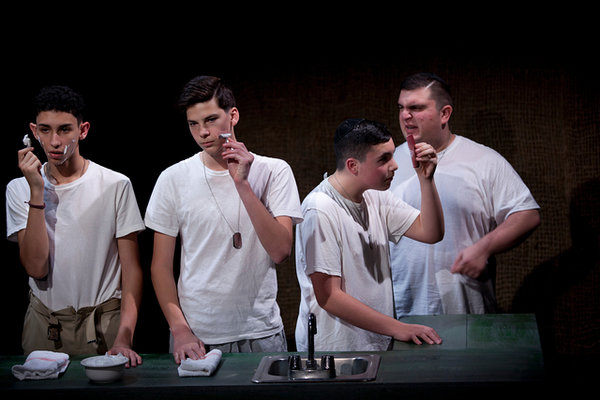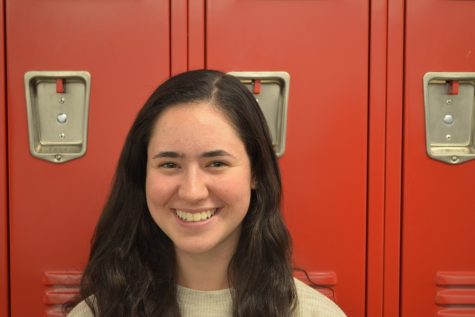Actors bring complexity to comedy in ‘Biloxi Blues’
January 8, 2015
In the dead of the night, a group of soldiers gazes mournfully at their comrade who is soon to be punished after being caught engaging in homosexual acts, and now changes into his army uniform, one piece at a time.
This was just one of many affecting scenes in Shalhevet Drama’s fall main stage production of Biloxi Blues, presented three times during Chanukah. A wistful comedy written by the prolific and well-known Jewish-American playwright Neil Simon, it tells the story of young draftees in basic training in Biloxi, Miss., during World War II.
Without the Wildfire Theater this year (due to construction), the Drama department rented the 99-seat Greenway Arts Alliance Theater near Fairfax High School. That meant the cast had less than a month to practice on set.
But it didn’t prevent the show from being entertaining, memorable and thought-provoking. The actors brought out laughs from the audience in almost every scene, and at the same time, the complexity of the way they interpreted the characters gave the comedy a more sophisticated undertone.
Biloxi Blues is narrated by the character Eugene Morris Jerome, an aspiring writer whose diary describes a conflict between the tough, middle-aged Sergeant Merwin J. Toomey and a young, inexperienced, Jewish soldier named Arnold Epstein.
Eugene, the narrator, was played by junior Mati Davis, who read aloud with just the right amount of enthusiasm his character’s commentary on the other soldiers and analysis of their diverse personalities. Mati would widen his eyes and look off into the distance, or sigh to convey his hopelessness in the platoon.
Sergeant Toomey was portrayed by David Lorell, who has now proven on stage not only his British accent, but a Southern one as well. Demanding discipline from the recruits, Lorell’s Toomey spoke in a deep, firm voice, walked with the no-nonsense, intimidating air of an army general, and stood with his back erect.
He conveyed constant authority, even in a scene towards the end of the play in which he managed to portray a drunken general as broken, desperate and vulnerable, yet still, somehow, commanding. That made it entirely believable when, for example, he would force the soldiers to do 100 pushups, or when Epstein, the Jewish soldier portrayed by freshman Noah Mermelstein, followed his command even though he was desperately in need of a bathroom.
As Epstein, from the play’s very first scene Noah masterfully conveyed a sense of bafflement combined with a drive to preserve his dignity. He used body language and facial expressions, he took thoughtful pauses instead of reciting his lines straight through, and occasionally he hunched his shoulders and looked down at the floor.
In a particularly compelling scene, Epstein tells Eugene how about having been assaulted in the latrine. Noah’s whole body trembled as he related the horrific experience and his acceptance that nothing could be done about it.
The rest of the cast made the most of their characters as well. Though the soldiers are taken aback by some of Eugene’s comments, such as when he writes that Epstein is probably gay, the actors presented characters who were deeply affected by Eugene’s observations.
Akiva Reuveni played the part of Joseph Wykowski, a racist, anti-Semitic soldier who carried an air of superiority and often directed nasty comments at his bunkmates. But Akiva played his character as an insecure bully who might not be so mean underneath.
Micha Thau, who portrayed soldier Roy Selridge, was very dynamic on stage — loud, obstinate and humorous, waxing back and forth between frustration and excitement.
Josh Joffe, who portrayed James Hennessey — the gay, Irish soldier called to face his punishment in the dead of the night – managed to make a strong impression with only a few lines. While getting dressed in that scene, he seamlessly conveyed a mix of shame, sadness, regret and dignity, all at the same time.
Freshman Ilan Bouskila played the part of Donald Carney, a soldier who is said to have a terrible voice and a habit of singing in his sleep. But Ilan actually sang beautifully, and impressed the audience also with his calm demeanor and emotion behind every line.
Unlike most Shalhevet plays, in Biloxi Blues the majority of the cast was male, with only one girl, who showed up in the second act.
Shana Lunzer played the part of Daisy Hannigan, whom Eugene meets and falls in love with on a night off from the base. Shana was charming and smoothly delivered her lines, and she and Mati believably emulated love at first sight.
Like Josh Joffe, who took his time getting dressed before leaving the base in the middle of the night and thus forced the audience to sympathize with his vulnerability, the cast of Biloxi Blues proved that the human condition is complex, vulnerable and multi-faceted – and moreover, can be represented truthfully even in a comedy.
At the same time, they proved that Shalhevet Drama can stay human, relatable and relevant in a department that is essentially homeless this year.














